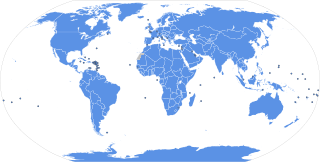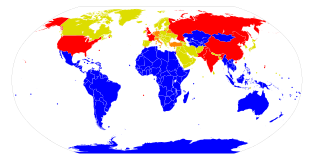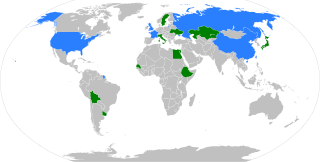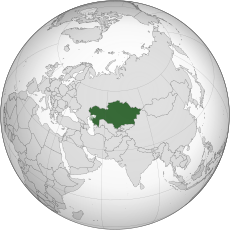
Foreign relations of Kazakhstan are primarily based on economic and political security. The Nazarbayev administration has tried to balance relations with Russia and the United States by sending petroleum and natural gas to its northern neighbor at artificially low prices while assisting the U.S. in the War on Terror. Kazakhstan is a member of the United Nations, Organization for Security and Co-operation in Europe, North Atlantic Cooperation Council, Commonwealth of Independent States, the Shanghai Cooperation Organisation, and NATO's Partnership for Peace program. Kazakhstan established a customs union with Russia and Belarus, transformed into the Eurasian Economical Community then in 2015 into the Eurasian Economic Union. President Nazarbayev has prioritized economic diplomacy into Kazakhstan's foreign policy.

The United Nations Security Council (UNSC) is one of the six principal organs of the United Nations (UN), charged with ensuring international peace and security, recommending the admission of new UN members to the General Assembly, and approving any changes to the UN Charter. Its powers include establishing peacekeeping operations, enacting international sanctions, and authorizing military action. The UNSC is the only UN body with the authority to issue binding resolutions on member states.

The United Nations General Assembly is one of the six principal organs of the United Nations (UN), serving as the main deliberative, policymaking, and representative organ of the UN. Its powers, composition, functions, and procedures are set out in Chapter IV of the United Nations Charter. The UNGA is responsible for the UN budget, appointing the non-permanent members to the Security Council, appointing the Secretary-General of the United Nations, receiving reports from other parts of the UN system, and making recommendations through resolutions. It also establishes numerous subsidiary organs to advance or assist in its broad mandate. The UNGA is the only UN organ wherein all member states have equal representation.

The United Nations member states are the 193 sovereign states that are members of the United Nations (UN) and have equal representation in the UN General Assembly. The UN is the world's largest intergovernmental organization.

A United Nations Security Council resolution is a United Nations resolution adopted by the fifteen members of the Security Council (UNSC); the United Nations (UN) body charged with "primary responsibility for the maintenance of international peace and security".

The United Nations Assistance Mission in Afghanistan (UNAMA) is a UN Special Political Mission established to assist the state and the people of Afghanistan in laying the foundations for sustainable peace and development.

A United Nations resolution is a formal text adopted by a United Nations (UN) body. Although any UN body can issue resolutions, in practice most resolutions are issued by the Security Council or the General Assembly.

The United Nations Security Council "veto power" refers to the power of the five permanent members of the UN Security Council to veto any "substantive" resolution. However, a permanent member's abstention or absence does not prevent a draft resolution from being adopted. This veto power does not apply to "procedural" votes, as determined by the permanent members themselves. A permanent member can also block the selection of a Secretary-General, although a formal veto is unnecessary since the vote is taken behind closed doors.
Chapter VII of the United Nations Charter sets out the UN Security Council's powers to maintain peace. It allows the Council to "determine the existence of any threat to the peace, breach of the peace, or act of aggression" and to take military and nonmilitary action to "restore international peace and security".

The Central Asian Nuclear-Weapon-Free Zone (CANWFZ) treaty is a legally binding commitment by Kazakhstan, Kyrgyzstan, Tajikistan, Turkmenistan, and Uzbekistan not to manufacture, acquire, test, or possess nuclear weapons. The treaty was signed on 8 September 2006 at Semipalatinsk Test Site, Kazakhstan, and is also known as Treaty of Semipalatinsk, Treaty of Semei, or Treaty of Semey.
The following outline is provided as an overview of and topical guide to the United Nations:
The Counter-Terrorism Committee is a subsidiary body of the United Nations Security Council.

United Nations Security Council resolution 1076, adopted unanimously on 22 October 1996, after considering the situation in Afghanistan, resolutions by the General Assembly and the Joint Declaration made on 4 October 1996 by the leaders of Kazakhstan, Kyrgyzstan, Russia, Tajikistan and Uzbekistan on developments in the country, the Council discussed the deteriorating political, military and humanitarian situation in Afghanistan.

United Nations Security Council Resolution 2016 was unanimously adopted on 27 October 2011. Recognizing the "positive developments" in Libya after the Libyan Civil War and the death of Muammar Gaddafi, the resolution set a date of termination for the provisions of Security Council Resolution 1973 which allowed states to undertake "all necessary measures" to protect civilians and which formed the legal basis for military intervention by a number of foreign states. The termination date was set at 23:59, Libyan local time on 31 October 2011. The no-fly zone created with Resolution 1973 was also lifted on that date.

The United Nations Supervision Mission in Syria (UNSMIS) was a United Nations peacekeeping mission in Syria, set up in 2012 as a result of United Nations Security Council Resolution 2043 in response to the Syrian Civil War. It was commanded by Norwegian Major General Robert Mood until 20 July 2012 followed by Lieutenant General Babacar Gaye from Senegal. Although observers remain in the country, Mood suspended their mission on June 16, 2012 citing "escalating violence". Observers will conduct no further patrols and stay in their current positions until the suspension is lifted. On 20 July 2012, the Security Council extended UNSMIS for a final period of 30 days. According to resolution 2059, the Council would only consider more extensions in the event that the Secretary-General reports and the Security Council confirms the cessation of the use of heavy weapons and a reduction in the level of violence sufficient by all sides to allow UNSMIS to implement its mandate.

The 2016 United Nations Security Council election was held on 28 June during the 70th session of the United Nations General Assembly, held at United Nations Headquarters in New York City. The elections were for five non-permanent seats on the UN Security Council for two-year mandates commencing on 1 January 2017. In accordance with the Security Council's rotation rules, whereby the ten non-permanent UNSC seats rotate among the various regional blocs into which UN member states traditionally divide themselves for voting and representation purposes, the five available seats were allocated as follows:

United Nations Security Council Resolution 2397 is a resolution adopted unanimously on 22 December 2017 in response to North Korea's launch of a Hwasong-15 intercontinental ballistic missile on 28 November of that year. The resolution condemned the launch and further tightened sanctions on the country, restricting fuel imports and other trade, as well as the ability of North Korean citizens to work abroad. On 24 December, the North Korean Ministry of Foreign Affairs stated that the resolution constitutes an act of war.

The Republic of Kazakhstan became a member of the United Nations on March 2, 1992. Kazakhstan was elected to serve on the UN Security Council for the 2017–2018 term. UN Secretary-General António Guterres in remarks to the UNSC recognized Kazakhstan's work to rid the world of weapons of mass destruction and global non-proliferation efforts.
The Declaration on the Rights of Peasants (UNDROP), officially United Nations Declaration on the Rights of Peasants and Other People Working in Rural Areas, is an UNGA resolution on Human rights with "universal understanding", adopted by the United Nations in 2018.











